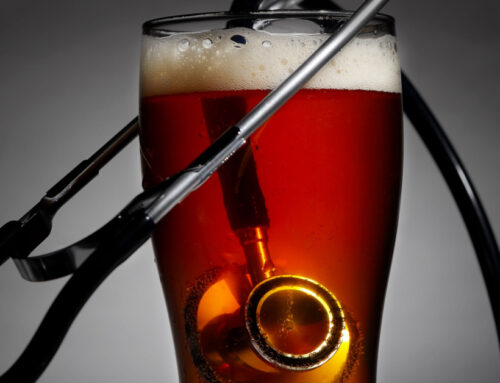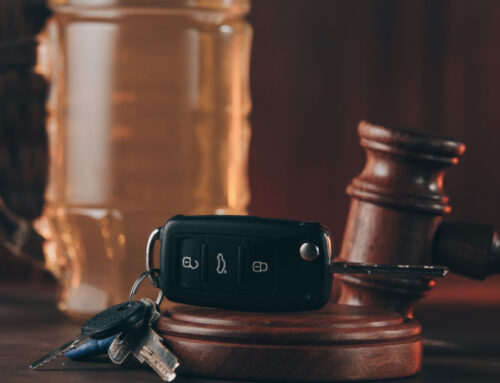Most people don’t know that you don’t actually have to be driving to be convicted of DUI.
“Actual Physical Control” in Arizona DUI Cases
This is based on the language of Arizona’s DUI law, which makes it a criminal offense to be in “actual physical control” of a vehicle while impaired by alcohol or drugs. However, the Arizona courts have held numerous cases that a person can be in “actual physical control” of a vehicle without actually driving.
For example, consider this common scenario: You go out to a bar. You have a few drinks. Then a few more, and your blood alcohol concentration (BAC) rises above Arizona’s legal limit of 0.08. But, you don’t feel too drunk to drive, so you head to your car.
You sit down in the driver’s seat with your key in your hand. While you are taking a moment to your thoughts, a police officer knocks on your window. The officer saw you stumble to your car, and he asks you to step out of the car. Then, after asking you a few questions, the officer arrests you for DUI.
But you never started your car. Shouldn’t this mean you have an open-and-shut case?
Not in Arizona. Under Arizona law, sitting in the driver’s seat with the key to your car is enough to establish “actual physical control”—and this is enough to establish guilt in a DUI case. So, even though you did not drive drunk, there is still an excellent chance that you will be convicted in court unless you have valid defenses available.
The “Temporary Shelter” Defense—When You Aren’t in “Actual Physical Control”
While it is possible to get a DUI even if you weren’t driving in Arizona, it is also possible to argue against “actual physical control” in some cases. This argument is based on Arizona’s “temporary shelter” rule.
Under this rule, a driver is not considered to be in “actual physical control” of a vehicle if the driver uses his or her vehicle for “temporary shelter.” To assert this defense, you must be able to successfully argue that you were not using your vehicle as a means of transportation but rather as a place to rest while you were too drunk to drive.
Let’s look at another example: You got drunk at a bar. Despite being drunk, you decided to drive yourself home. On the way, you realized that you probably weren’t going to get yourself home safely, so you pulled off onto the shoulder. You shifted into park, left your car running, and fell asleep.
You woke up to the sound of a police officer knocking on your window. After going through the motions, the officer arrested you for DUI.
In this example, even though you drove drunk, you may be able to avoid a conviction by asserting the “temporary shelter” defense. This is because, at the time you got arrested, you were not in “actual physical control” of your vehicle—you were asleep, and your car was parked on the side of the road. Legally speaking, you were using your vehicle as a “temporary shelter” so that you could rest safely while you were too drunk to drive.
Challenges with the “Temporary Shelter” Defense in Arizona
Does this mean that you can avoid a DUI any time you aren’t actually driving by claiming that you were “resting” when the arresting officer approached your vehicle? No, it does not.
In fact, there are several ways that prosecutors can still successfully pursue a DUI charge even if you actually were resting at the time of your arrest. For example:
- There is video footage of you driving drunk. So even if you are using your vehicle as “temporary shelter” when the police approach you, you could still get convicted if there is evidence that you were driving drunk before you took shelter. This could be the case, for example, if there is a traffic camera or surveillance camera footage of your vehicle in motion.
- The officer saw you moving in your car. If your arresting officer can testify that he or she saw you moving in your car, this could be enough to overcome your argument that you were taking shelter. At this point, it will be your word against the arresting officers. On the other hand, if the offer testifies to seeing you start your car or seeing you pull over, this could be all it takes to establish that you were in “actual physical control.”
- You admitted to driving drunk. If you admitted to driving drunk, the prosecution would be able to use your admission to seek a conviction in Arizona court. Taking “temporary shelter” does not provide you with immunity—it only provides a defense against “actual physical control” while your vehicle is stationary. If you tell the police that you pulled over because you realized you were too drunk to drive, your own statement could be enough to establish the prosecution’s case against you.
With this in mind, when attempting to assert the “temporary shelter” defense, you need to be very careful. You need to avoid saying anything that can be used against you, and you need to be sure the prosecution doesn’t have evidence that you were in “actual physical control” of your vehicle at any point in time. All of this requires experienced legal representation. Therefore, to make sure you assert an effective defense in your Arizona DUI case, you should discuss your case with an experienced Phoenix DUI attorney as soon as possible.
Schedule a Free Consultation with an Experienced Phoenix DUI Defense Lawyer
Do you think you may be able to assert the “temporary shelter” defense in your Arizona DUI case? To learn more, schedule a free consultation at The Weingart Firm. You can reach us 24/7, so call 480-405-7922 or contact us online now to speak with an experienced Phoenix DUI defense lawyer as soon as possible.






